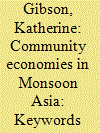|
|
|
Sort Order |
|
|
|
Items / Page
|
|
|
|
|
|
|
| Srl | Item |
| 1 |
ID:
161582


|
|
|
|
|
| Summary/Abstract |
A diversity of place‐based community economic practices that enact ethical interdependence has long enabled livelihoods in Monsoon Asia. Managed either democratically or coercively, these culturally inflected practices have survived the rise of a cash economy, albeit in modified form, sometimes being co‐opted to state projects. In the modern development imaginary, these practices have been positioned as ‘traditional’, ‘rural’ and largely superseded. But if we read against the grain of modernisation, a largely hidden geography of community economic practices emerges. This paper introduces the project of documenting keywords of place‐based community economies in Monsoon Asia. It extends Raymond William’s cultural analysis of keywords into a non‐western context and situates this discursive approach within a material semiotic framing. The paper has been collaboratively written with co‐researchers across Southeast Asia and represents an experimental mode of scholarship that aims to advance a post‐development agenda.
|
|
|
|
|
|
|
|
|
|
|
|
|
|
|
|
| 2 |
ID:
169136


|
|
|
|
|
| Summary/Abstract |
It appears that an almost unquestioned development pathway for achieving gender equity and women's empowerment has taken centre stage in mainstream development. This pathway focuses on economic outcomes that are assumed to be achieved by increasing women's access to material things, including cash income, loans, physical assets, and to markets. Gender equity indicators, which measure progress towards these outcomes, cannot escape reinforcing them. We argue that far from being neutral, indicators are embedded in political and ideological agendas that serve as guides to the appropriate conduct of those whose performance or behaviour is being measured. Drawing on participatory feminist, diverse economies and strengths based approaches, we outline a research methodology for developing community‐based indicators that recognises women's and men's participation and relationships in all spheres of life, including the ‘non‐economic’. If indicators are grounded in local meanings and realities, we propose that community members can use them to identify aspirational goals for gender equity, and measure progress towards these goals.
|
|
|
|
|
|
|
|
|
|
|
|
|
|
|
|
| 3 |
ID:
185115


|
|
|
|
|
| Summary/Abstract |
Anthropogenic climate change poses huge challenges to humanity. The frequency and magnitude of extreme weather is increasing. As more attention turns to disaster preparedness and recovery, it is worth recognising that many communities have a long history of living with the flux of planetary dynamism. They are experienced in negotiating collective well-being with one another and with the earth. Other communities have less experience and know-how and have had to adopt more experimental approaches. In this paper we draw on planetary social thought and critical disaster studies to re-think disaster recovery. We present stories of communities in the Philippines differently negotiating collective well-being in the face of climate uncertainty.
|
|
|
|
|
|
|
|
|
|
|
|
|
|
|
|
| 4 |
ID:
185111


|
|
|
|
|
| Summary/Abstract |
The rapid expansion of urban development in Asia over the last 50 years has seen a rise in demand for building materials. From large construction companies to squatter settlers seeking to improve their housing, concrete is the building material of choice. In the Philippines there is plentiful supply of the limestone and aggregate (sand and gravel) required for concrete production. Alongside the large quarries owned by major corporations are small, often illegal quarries, supplying aggregate to the construction industry. In these shadow places informal miners scratch out a precarious livelihood. They are members of a vast artisanal and small-scale mining (ASM) workforce that is global in extent. This paper situates informal aggregate mining in the diverse economy of concrete in the Philippines and within the context of global ASM studies. With a detailed study of one quarry on the edges of Metro Manila, it reveals how mining contributes to the survival portfolio of poor households. Without romanticising the lives of quarry labourers, we identify a range of negotiations by which informal miners create a community of commoners in a contested quarry site. This research provides insight into the capacities that informal miners could bring to designing more sustainable development pathways within and beyond the extractive industry.
|
|
|
|
|
|
|
|
|
|
|
|
|
|
|
|
|
|
|
|
|